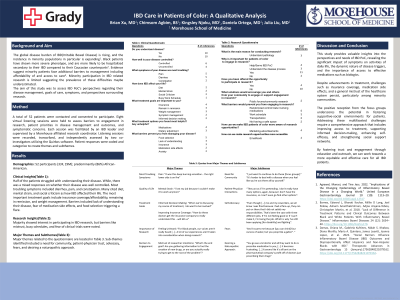Monday Poster Session
Category: IBD
P2619 - IBD Care in Patients of Color: A Qualitative Analysis
Monday, October 28, 2024
10:30 AM - 4:00 PM ET
Location: Exhibit Hall E

Has Audio

Brian Xu, MD
Morehouse School of Medicine, GA
Presenting Author(s)
Brian Xu, MD1, Chimsom Agbim, MS1, Kingsley Njoku, MD1, Daniela Ortega, MD1, Julia J.. Liu, MD2
1Morehouse School of Medicine, Atlanta, GA; 2Morehouse School of Medicine, Decatur, GA
Introduction: Disease burden of Inflammatory bowel disease (IBD) is rising, and the incidence in minority populations is expanding. Minority patients face additional barriers to disease management, including the affordability of and access to care. The aim of this study was to engage IBD patients of color in a focus-groups to better understand their perspectives on IBD including goals of care, challenges of disease management, and troubling symptoms.
Methods: 8 focus group sessions led by an IBD patient facilitator, a research assistant, and a physician to answer any questions or concerns. Inclusion criteria included adults diagnosed with IBD, family, or friends of IBD members. 14 questions (Table 1) were asked of participants during each session. Listening sessions were recorded, transcribed, and coded for hierarchy themes. Software analysis, “Quirkos”, was used to aid in the development of themes.
Results: The study included 52 participants (33F, 19M) with a median age of 42.8 years old, and 85% identifying as Black. Table 1 includes the questionnaire used and the number of times topics were referenced. Ten respondents felt they did not understand their disease. Six respondents who expressed control of their disease cited avoiding of flare-inducing behaviors, making positive lifestyle changes, and consistently taking medications as ways to reduce disease burden. Pain, diarrhea, and constipation were the most troubling symptoms. Mental strain, social criticism, and diet changes associated with IBD suggested a poor quality of life. Treatment goals included remaining in remission and improving insurance coverage. Barriers in management included challenges with food selections, lack of understanding, and fear of medication side effects. Respondents are open to participating in research, especially qualitative designs, but are hesitant to join randomized control trials. Sub-themes, independent of the standard questions, were identified as evolving food intolerance, a desire for creating community, and the need to advocate for one-self.
Discussion: Themes identified in patient listening session included lack of understanding their disease, poor quality of life, and treatment options dictated by payer. Participants are open to participating in research, especially qualitative designed projects. Sub-themes highlighted the importance of community and self-advocacy. However, there are hesitancies surrounding randomized control trials, especially involving medications.
Note: The table for this abstract can be viewed in the ePoster Gallery section of the ACG 2024 ePoster Site or in The American Journal of Gastroenterology's abstract supplement issue, both of which will be available starting October 27, 2024.
Disclosures:
Brian Xu, MD1, Chimsom Agbim, MS1, Kingsley Njoku, MD1, Daniela Ortega, MD1, Julia J.. Liu, MD2. P2619 - IBD Care in Patients of Color: A Qualitative Analysis, ACG 2024 Annual Scientific Meeting Abstracts. Philadelphia, PA: American College of Gastroenterology.
1Morehouse School of Medicine, Atlanta, GA; 2Morehouse School of Medicine, Decatur, GA
Introduction: Disease burden of Inflammatory bowel disease (IBD) is rising, and the incidence in minority populations is expanding. Minority patients face additional barriers to disease management, including the affordability of and access to care. The aim of this study was to engage IBD patients of color in a focus-groups to better understand their perspectives on IBD including goals of care, challenges of disease management, and troubling symptoms.
Methods: 8 focus group sessions led by an IBD patient facilitator, a research assistant, and a physician to answer any questions or concerns. Inclusion criteria included adults diagnosed with IBD, family, or friends of IBD members. 14 questions (Table 1) were asked of participants during each session. Listening sessions were recorded, transcribed, and coded for hierarchy themes. Software analysis, “Quirkos”, was used to aid in the development of themes.
Results: The study included 52 participants (33F, 19M) with a median age of 42.8 years old, and 85% identifying as Black. Table 1 includes the questionnaire used and the number of times topics were referenced. Ten respondents felt they did not understand their disease. Six respondents who expressed control of their disease cited avoiding of flare-inducing behaviors, making positive lifestyle changes, and consistently taking medications as ways to reduce disease burden. Pain, diarrhea, and constipation were the most troubling symptoms. Mental strain, social criticism, and diet changes associated with IBD suggested a poor quality of life. Treatment goals included remaining in remission and improving insurance coverage. Barriers in management included challenges with food selections, lack of understanding, and fear of medication side effects. Respondents are open to participating in research, especially qualitative designs, but are hesitant to join randomized control trials. Sub-themes, independent of the standard questions, were identified as evolving food intolerance, a desire for creating community, and the need to advocate for one-self.
Discussion: Themes identified in patient listening session included lack of understanding their disease, poor quality of life, and treatment options dictated by payer. Participants are open to participating in research, especially qualitative designed projects. Sub-themes highlighted the importance of community and self-advocacy. However, there are hesitancies surrounding randomized control trials, especially involving medications.
Note: The table for this abstract can be viewed in the ePoster Gallery section of the ACG 2024 ePoster Site or in The American Journal of Gastroenterology's abstract supplement issue, both of which will be available starting October 27, 2024.
Disclosures:
Brian Xu indicated no relevant financial relationships.
Chimsom Agbim indicated no relevant financial relationships.
Kingsley Njoku indicated no relevant financial relationships.
Daniela Ortega indicated no relevant financial relationships.
Julia Liu indicated no relevant financial relationships.
Brian Xu, MD1, Chimsom Agbim, MS1, Kingsley Njoku, MD1, Daniela Ortega, MD1, Julia J.. Liu, MD2. P2619 - IBD Care in Patients of Color: A Qualitative Analysis, ACG 2024 Annual Scientific Meeting Abstracts. Philadelphia, PA: American College of Gastroenterology.
